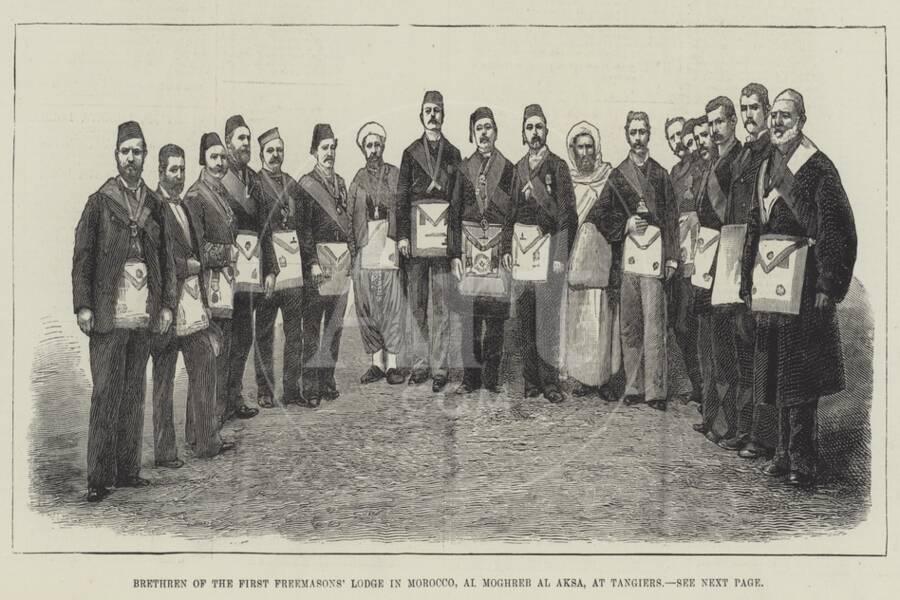MASONIC HISTORY
Freemasonry in Lebanon and Morocco:
History, Culture, and Societal Influence
The history of Freemasonry in the Middle East is a complex one that is intricately entwined with the political, social, and cultural environments of the region, particularly Lebanon and Morocco, where there are challenges that could lead to the decline, or even extinction, of Masonry there.


Lebanon: A Legacy of Independence and Cultural Enrichment
Under the auspices of the Grand Lodge of Scotland, Palestine Lodge 415, Lebanon’s first regular Masonic lodge, was founded in 1861. Operating in French, the lodge soon gained prominence among Lebanese professionals, intellectuals, and businessmen who were drawn to the Craft’s values of integrity, brotherhood, and intellectual pursuit (Morris, 2005). Notable individuals such as Arab nationalist and scholar Emir Shakib Arslan found inspiration in the fraternity to work toward social and political reforms in Lebanese society (Cleveland, 2004).
During Lebanon’s early twentieth century path to independence from the Ottoman Empire, Freemasons became influential members of the nationalist cause. They fought for political change, encouraged harmony among the various Lebanese communities, and made a substantial contribution to the debate on ideas and culture that shaped the young country (Fawaz, 1994). Lodges were lively salons that promoted conversations about literature, philosophy, and the arts, enhancing the nation’s cultural landscape. Palestine Lodge’s Bechara El Khoury, eventually the first President of Lebanon, personified the Freemasons’ dedication to promoting national prosperity and unity.
Even through the Lebanese Civil War, Freemasonry showed incredible fortitude. Lodges persisted, if somewhat covertly at times, offering a haven for communication and comprehension among the mayhem (Khalaf, 2010). They actively worked to bridge religious barriers by highlighting their non-sectarian nature and dedication to the brotherhood of man. Prominent Sunni scholar and Grand Orient of France member Sheikh Salim Takieddine served as an example of the fraternity’s dedication to interfaith harmony and dialogue.

Morocco: Navigating Colonialism and Modernity
Freemasonry arrived in Morocco in the late nineteenth century, during the period of European colonialism. The first lodge, La Réunion Française, was founded in Tangier in 1883 and served predominantly French residents (Pennell, 2013). However, it was not long before Moroccan intellectuals and elites became interested in Freemasonry’s ideas of enlightenment, progress, and global brotherhood (Dumper & Stanley, 2007).
Moroccan Freemasonry experienced unique obstacles as a result of the country’s complex politics under French and Spanish rule. Lodges frequently had to find ways to uphold Masonic values and while respecting authorities’ sensibilities (Rogerson, 2003). However, Freemasonry gained popularity among Moroccan nationalists, who saw it as a way to link with European ideals and institutions, promoting a sense of modernity and development (Hoisington, 1995). Prominent figures, like Thami El Glaoui, the Pasha of Marrakesh; and Mehdi Ben Barka, a leading opposition figure, were Freemasons who significantly impacted Moroccan politics and society (Maxwell, 2018). El Glaoui was a Mason under the Grand Lodge of France. Ben Barka’s affiliation remains uncertain, with some sources suggesting he was a member of the Grand Orient of France.
Freemasonry thrived in Morocco, helping the nationalist struggle and the advancement of Moroccan intellectual and cultural life. After Morocco attained independence in 1956, Freemasonry continued to evolve, responding to new political circumstances and societal changes. Lodges became more open, accepting members from a variety of backgrounds and embracing a unique Moroccan identity (Pennell 2013). Notable personalities, such as former Prime Minister Abderrahman El Yousoufi; and Mohamed El Fassi, a notable Islamic scholar and reformer, were Freemasons who contributed significantly to the country’s growth.
The Future: Challenges and Uncertainties
While Freemasonry has a long and varied history in the Middle East, its future is questionable. Diminishing membership, societal trends toward more conservative ideals, and ongoing distrust from governmental and religious authorities all pose serious obstacles to its survival.
The persistent political instability and economic crisis in Lebanon have made it difficult for Freemasonry to thrive. The “brain drain” exodus of young professionals does not bolster the fraternity’s prospects. Furthermore, the rise of religious conservatism and sectarian conflicts in Lebanese culture has heightened scrutiny and distrust of Freemasonry, which may impede its expansion and outreach.
While Freemasonry in Morocco has adapted to a post-colonial era, it still confronts obstacles in terms of public perception and government regulation. Some Moroccans perceive secrecy and hold suspicions of Western ideas. Furthermore, the government’s limits on freedom of organization and assembly may hinder lodges’ capacity to operate freely and attract new members.
While the extinction of Freemasonry in Lebanon and Morocco is not imminent, it is a real risk. Masonry has included prominent figures who helped influence their countries’ political, social, and cultural environments. To maintain its future, Freemasonry must address the issue of dwindling membership by actively interacting with younger generations and emphasizing its relevance in the modern world. It must also actively engage with the public and the government to dispel myths and foster trust.
References:
-
Cleveland, W. L., A History of the Modern Middle East, Westview Press, 2004.
-
Dumper, M., & Stanley, B. E., Cities of the Middle East and North Africa: A Historical Encyclopedia, ABC-CLIO, 2007.
-
Fawaz, L., An Occasion for War: Civil Conflict in Lebanon and Damascus in 1860, University of California Press, 1994.
-
Hoisington, W. A., Lyautey and the French Conquest of Morocco, Palgrave Macmillan, 1995.
-
Khalaf, S., Lebanon’s Predicament, Columbia University Press, 2010.
-
Maxwell, G., Lords of the Atlas: The Rise and Fall of the House of Glaoua, 1893-1956, Eland Publishing, 2018.
-
Morris, S., Freemasonry in the Holy Land: A History of the Craft in Palestine, Israel, and Jordan,B. Tauris, 2005.
-
Pennell, C.R., Morocco Since 1830: A History, C. Hurst & Co. Publishers, 2013.
-
Rogerson, B., Morocco, Globe Pequot Press, 2003.
Written by: Bro. Anis D. Okbani
Bro. Okbani is a proud New York Mason, being a member of Anchor-Astoria Lodge 729 and Cornucopia Lodge 563, Queens District and Queens Masonic Association; a 32° Scottish Rite Mason; a Royal Arch Mason; and a Noble of the Mystic Shrine.